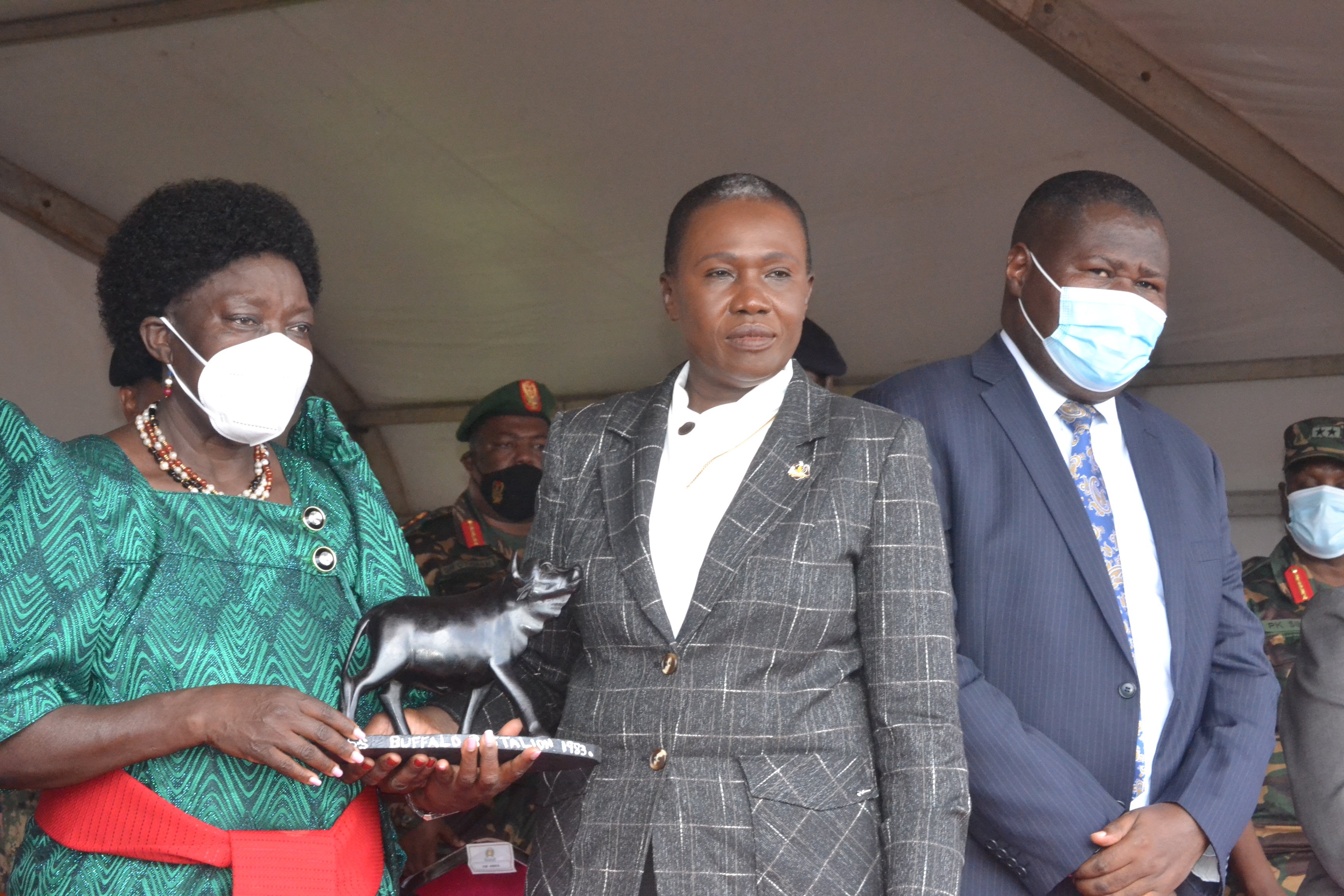Prime
Officials from EAC member states want Swahili made compulsory in schools

First Deputy Prime Minister and Minister of EAC Affairs, Ms Rebecca Kadaga (Left) receives a gift from Ms Angelina Teny, Minister of National Defence and War Veterans Republic of South Sudan (Centre) and State Minister for Defence Jacob Oboth Oboth during the function at Gaddafi Barracks on Friday. PHOTO/DENIS EDEMA
What you need to know:
- Dr Tax Lawrence Stergomena, the Tanzanian Minister for Defense and National Service, said having Kiswahili as a regional language will promote peace and culture
Members of East African Legislative Assembly [EALA] and leaders of the East African Community [EAC] member states want Kiswahili made compulsory among their education syllabuses to ease communication, promote culture, trade and unity.
The leaders made the remarks on Friday during the closure of training exercises for Armed Forces from the seven member states of Rwanda, Burundi, Kenya, Tanzania, South Sudan, Uganda and the Democratic Republic of Congo held at Gaddafi Barracks in Jinja.
About 5 million people are believed to speak Kiswahili as primary language and 60 million as a secondary language within the region.
The two-week Field Training Exercise, that drew 1,533 personnel from the regular army, Prisons, Police and Civilians, aimed at promoting peace, fighting terrorism and counter piracy.

A section soldiers during the closing ceremony of the EAC Armed Forces Field Training Exercise (FTX) USHIRIKIANO IMARA 2022 at Gaddafi Barracks in Jinja City on Friday. PHOTO/DENIS EDEMA
Mr Eugene Wamalwa, the Secretary General of Defense for Kenya said: “It will be great that in any engagement, we use Kiswahili as our own identify language for East Africa; therefore, as a member state, I request that we introduce it in our education systems to as a regional language that unites East African culture and trade.”
Mr Martin Ngoga, the EALA Speaker, of EALA said as we continue lobbying for [regional] integration, we should have joint promotion of peace and trade, while using Kiswahili as our regional language, since it has been recognized in Africa.
Dr Tax Lawrence Stergomena, the Tanzanian Minister for Defense and National Service, said having Kiswahili as a regional language will promote peace and culture.
The First Deputy Prime Minister and minister of EAC Affairs, Ms Rebecca Kadaga, who represented President Museveni, said Cabinet is preparing a Paper to ensure that Swahili becomes compulsory and examinable in schools.
She said: “A survey was conducted within the EAC, and the country that came out last was Uganda; so, the survey is that ‘Yes! Swahili was born in Zanzibar, came to Tanzania, matured in Kenya, fell sick in Rwanda and Burundi, went into Intensive Care in DR Congo and died in Uganda’.”
“I want to agree with my counterparts that we are going to correct this situation, are preparing a Cabinet Paper and my proposal is that Swahili becomes compulsory and examinable in schools to produce citizens who are proficient in the language,” she added.
President Museveni, in his speech read by Ms Kadaga, said EAC integration is important in the creation and promotion of markets for the goods across the region.
For example, Mr Museveni said, Uganda’s market only for 44 million people is too small to guarantee prices for goods and services that people of Uganda produce.
This is good for self-economic transformation to create access for bigger markets for Uganda’s export base of agricultural goods and industrial goods like steel products and plastics across the EAC,” Mr Museveni said.
In 2017, Uganda National Curriculum Development Centre (NCDC) finalised the secondary school curriculum where Swahili was introduced as a compulsory subject alongside English.
However, a report has indicated that there is low uptake of the subject by institutions and learners in Uganda which is affecting its objectivity.
In 2017, Rwanda introduced Kiswahili as a compulsory subject in her education syllabus, while Uganda is set to celebrate her first international day of Kiswahili on July 7.




